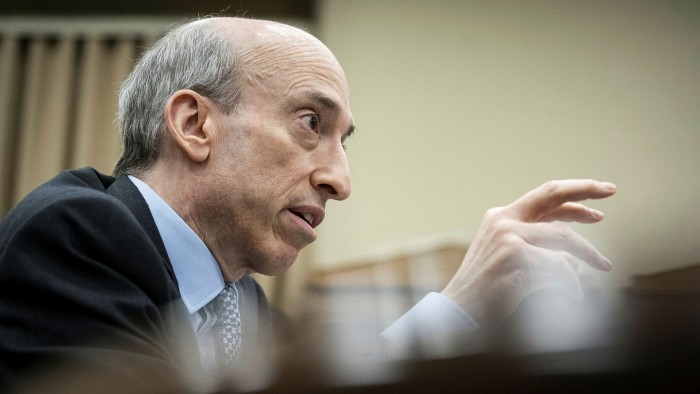SEC prepares to crack down on misleading ESG investment claims

Simply sign up to the ESG investing myFT Digest -- delivered directly to your inbox.
The US securities regulator is poised to crack down on exaggerated environmental, social and governance credentials in investment products, preparing standards for a sustainable funds industry that has boomed to almost $3tn.
Rules being prepared by the Securities and Exchange Commission would specify disclosures to be made by investment funds that have terms such as “ESG”, “sustainable”, or “low-carbon” in their names. The rules are expected to require information about how ESG funds are marketed, how ESG is incorporated into investing and how these funds vote at companies’ annual meetings, according to people familiar with the SEC’s thinking.
Global sustainable fund assets totalled $2.77tn at the end of the first quarter of 2022, up from $1tn in 2019, according to Morningstar, a data provider. The broader ESG investing category covers environmental and climate considerations, “impact” investing for the social good as well as funds that screen out industries such as tobacco or firearms.
“There is currently a wide range of what asset managers might mean by certain terms and what criteria they might use,” Gary Gensler, SEC chair, said in March. “It is easy to tell if milk is fat free. It might be time to make it easier to tell whether a fund is really what they say they are.”
The four-member SEC, which includes Gensler and two other Democratic appointees, is scheduled to vote on Wednesday to release the draft rules for public comment.
The agency has already signalled a tougher stance on the issue. On Monday, it announced a $1.5mn legal settlement — its first related to funds’ ESG descriptions — against BNY Mellon’s investment adviser division over allegations of misstating and omitting information about ESG criteria for mutual funds it managed. BNY Mellon said none of the sustainable funds it offered were targeted by the regulator and that it had updated its fund materials.
“Greenwashing is a huge problem, and the SEC is right to deal with it,” said Jonathan Macey, professor at Yale Law School, adding the regulator’s enforcement action against BNY Mellon and its proposals on eco-friendly definitions would “have a significant impact on mutual funds’ disclosures around ESG”.
In the US, 65 funds have been repackaged into ESG funds since the beginning of 2019, according to Morningstar. Funds that were struggling to attract inflows changed their names and prospectuses to ride the sustainable investing wave, said Jon Hale, director of sustainability research for the Americas at Sustainalytics, a Morningstar company.
“A lot of financial advisers are OK with recommending ESG investments if clients are asking for them, but I am not sure how discerning they are being,” Hale said. “Consumers wonder, ‘What is it, and is it authentic?’”
The draft SEC rules derive from an analysis of the ESG market conducted in April 2021. They build on a “naming rule”, adopted in 2001, which requires funds to invest at least 80 per cent of assets in a way suggested by the name. For example, a stock fund cannot have more than 20 per cent in cash or Treasury bonds.
Jill Fisch, securities law professor at Penn Law, warned that “heavy-handed rulemaking” in an “evolving” field such as ESG “might have a chilling effect on market innovation in this space”. Funds’ disclosures have already become more “expansive” in an area where there is no “market consensus around what constitutes an ESG fund”, she added.
“These are not standardised products . . . A rule that attempts to standardise what constitutes an ESG fund is going to be a big step backward for people who want to invest in this space,” Fisch said. “Standardisation is not the same thing as clarity”.
The SEC has also proposed more stringent guidelines on corporate climate disclosures, in March releasing long-awaited rules that would force public companies to reveal their direct greenhouse gas emissions and have them verified by a third party. The agency did not respond to requests for comment.
Climate Capital

Where climate change meets business, markets and politics. Explore the FT’s coverage here.
Are you curious about the FT’s environmental sustainability commitments? Find out more about our science-based targets here
The commission is also catching up with regulators in Europe. The EU’s sustainable finance taxonomy, which would establish a list of eco-friendly economic activities, is expected to be approved by the European parliament in July.
The Investment Adviser Association, a trade group, urged the SEC to give leeway in its ESG proposal to professionals’ fiduciary duties to clients. “We would be concerned if the SEC either limited or mandated consideration by fiduciaries of any factors, including ESG,” said Gail Bernstein, the IAA’s general counsel.
Jennifer Han, head of global regulatory affairs at the Managed Funds Association, whose members include hedge funds, said: “Any rule should help provide clarity for alternative asset managers engaging in ESG strategies and be calibrated to the differing needs of institutional and retail investors.”
The Investment Company Institute, whose members include mutual funds and exchange traded funds, declined to comment.
Additional reporting from Andy Bounds in Brussels

Comments